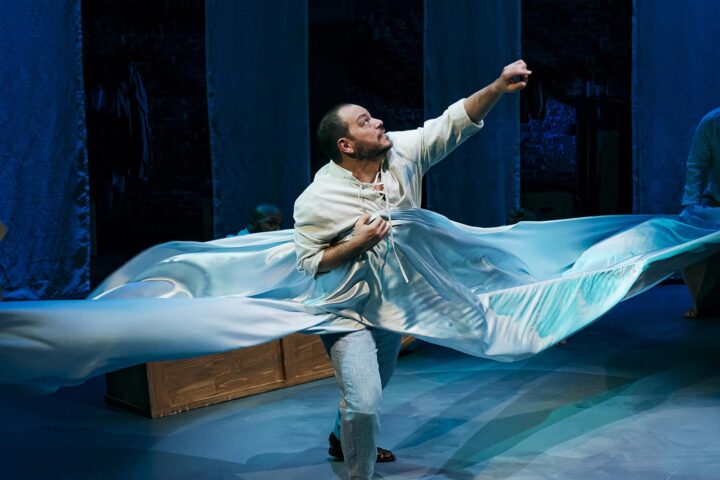“What looks at first to be remarkable, bizarre, will soon reveal itself to be part of a pattern,” sings Ethan Dobson (Ben Levi Ross), a just-out-of-Princeton wünderkind, at the start of the new musical The Connector, as he lands a coveted job writing features for a legendary magazine. And though he explains that the lyric is a quote from the venerated founder of the titular magazine, what’s quickly revealed is that it’s Ethan himself who’s remarkable, bizarre, and part of a pattern we’ll soon recognize all too well.
That pattern, especially as exposed under the blazing spotlight shone by Robin Martinez (Hannah Cruz), an overlooked female Latina staffer at the magazine and the musical’s blistering narrator, is nothing less than the patriarchy. “Half the stories of the world are left unwritten/Half the stories of the world are kept unread,” Robin protests in “Cassandra,” the darkly glittering crown jewel of Jason Robert Brown’s near-impeccable score.
Robin, scathingly observing her newly minted half-rival, half-crush from across the stage, is the copy-editing Che Guevara to Ethan’s high-flying, adored Evita. And though Robin’s colleagues keep suggesting that she and Ethan are a romantic item, Cruz’s venom-tinged smiles make clear from the start that she’s less comfortable in considering Ethan in close proximity as a romantic prospect than in observing him from a distance as a sort of zoo animal. He’s a peacock with plumage so outrageously iridescent that she can’t stop pressing up against the glass to watch.
But The Connector finds its sharpest edges in another metaphorical surface: the glass ceiling that Robin struggles to push through without, as she puts it, “getting shards stuck in my arteries.” Ethan, almost instantly upon his arrival at the magazine in 1995, receives everything that Robin has spent her whole career cautiously cultivating: a stream of published stories, a casual camaraderie with the editor-in-chief (an understated Scott Bakula), and even the unflinching backing of the magazine’s legal counsel as his muckraking wades into increasingly murky territory. After getting rejection after rejection, Robin’s not even sure she’ll make it into print. “I have nightmares that I’ll copy edit my own obituary after some man who’s younger than I am gets to write it,” she admits to Ethan, confiding in him despite her misgivings.
When Robin is introduced, she’s long abandoned any starry-eyed fantasies of overnight success. She’s perfectly poised to be a musical theater character, given that she’s been waiting desperately for an audience for far too long. So when Ethan’s carelessly tossed matches ignite Robin’s powder keg of long-simmering fury, her soliloquies unleash with a torrent of well-crafted imagery, married to scorching high notes that she’s been quietly holding back. In “Cassandra,” Robin imagines herself one of a multitude of modern-day versions of the Trojan prophetess, their prognostications ignored by men so blithely certain they know better.
Brown writes brilliantly for Cruz’s piercing belt, but he also invents a more slippery sound for Ethan. Ross, a former Evan Hansen on Broadway, has adopted some of that show’s original star Ben Platt’s vocal mannerisms, and he transplants some of Evan’s nervous tics to Ethan. Those work well, with Ethan’s anxious fidgeting effectively undercutting his cocksure smarminess. Ross makes sure that we never stop wanting to like Ethan, daunting as the task may be.
That’s because Ethan’s tenure at The Connector takes explicit inspiration from Stephen Glass’s notoriously short-lived career at The New Republic. Those familiar with the basic outline of that late-’90s fall from grace (depicted in the film Shattered Glass) won’t find The Connector’s plot turns surprising. Even if you can’t pin down where you’ve heard this story before, the show seems to gesture toward inevitable revelations about Ethan’s writing from the start.
If there’s a red pen waiting for The Connector, perhaps it should underline the challenges of telling a tale with a twist that most of the audience will see coming from miles off. (The creative team hasn’t been shy about giving the game away in interviews either.) Indeed, you may wonder if there’s merit in an edit that, by spilling the beans earlier on, spent more time in trying to make sense of Ethan’s unraveling rather than simply hurtling toward it.
Perhaps, but The Connector’s momentum is already pretty addictive, thanks to the electric collaboration of the writers and director Daisy Prince, who brought the concept to Brown shortly after helming his off-Broadway musical The Last Five Years in 2002. Prince keeps Robin and Ethan’s officemates constantly in motion and always on stage, either typing away at their desks or observing the action with intense curiosity, offering backing vocals while perched on piles of manuscripts that tower on either side of the stage. And Brown’s score, livelier if less sweeping than those for Parade and The Bridges of Madison County but more clever and compact than anything else he’s written, keeps moving too. Where he most excels as a composer, in soaring vocal lines that gaze down on nomadic grooves laced with sizzling piano licks, is the perfect landscape for a show like this. (He also conducts the show’s entire run from the keyboard.)
Brown’s songs seem to blossom sideways from the story, the characters’ imaginations musically inflating their relatively narrow world. Watching his boss interviewed on Brian Lamb’s Booknotes program (a precise late-’90s touch), Ethan sings the answers himself, as if rehearsing his own ascent. Right after a confrontation between Ethan and Robin, the ensemble joins Ethan as he incants, over and over, a cryptic quote from his next piece: “Help me forget everything/And start again.” A ballad for Bakula about the coming forces of the next generation (and the ever-looming World Wide Web) interweaves with scenes of a close-reading subscriber (Mylinda Hull) penning increasingly aggrieved letters to the editor.
And because Brown and Sherman tend to stay out of each other’s way while still working in thoughtful tandem, there’s an unusual balance between the score and the book that make The Connector an equally emotionally and intellectually satisfying ride. (One exception to this equilibrium is that, though Sherman has fun imagining Ethan’s intoxicating prose, the score flags in three songs that seek to bring a trio of Ethan’s feature pieces to life, including, least convincingly, through rap, far from Brown’s natural idiom.)
Ethan seems to believe that it’s the emotional impact that matters more than the details. If his readers find themselves swept into his storytelling, who needs a fact-checker? That may not fly in the journalism world, but it’s true enough for theater. The occasional plot holes or disjunctions in Jonathan Marc Sherman’s book fade away in the whirlwind of Jeanette Oi-Suk Yew’s electrifying projections playing tricks across set designer Beowulf Boritt’s backdrop grid of magazine spreads, Brown’s peripatetic rhythms, and Prince’s thriller-paced, haunting staging.
“I type a sentence and negotiate the space between the thing that was and how it is remembered,” Ethan sings, a mantra of self-importance alight with the certainty that it’s his writing that sculpts the truth and not the other way around. The Connector’s characters reach beyond their time and place to point, Cassandra-like, toward the litany of offenses against the truth that would stack up over the next 25 years. In that way, Ethan comes to represent, at least in part, the unchecked id that the internet would proliferate in reporting news across America.
But there were Robins writing over the past decades, too, and The Connector compellingly cheers on their fiery integrity, sending up a prayer that the remarkable Robins, too, will become part of their own principled, truth-seeking pattern.
The Connector is now running at the MCC Theater.
Since 2001, we've brought you uncompromising, candid takes on the world of film, music, television, video games, theater, and more. Independently owned and operated publications like Slant have been hit hard in recent years, but we’re committed to keeping our content free and accessible—meaning no paywalls or fees.
If you like what we do, please consider subscribing to our Patreon or making a donation.




